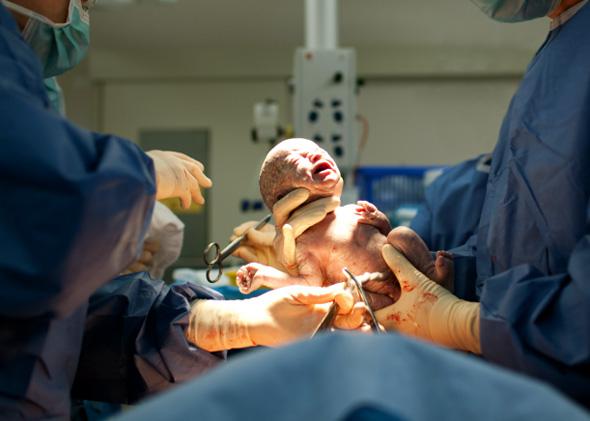
On Tuesday, September 3, 2024, Soroti City was engulfed in sorrow after the tragic passing of 36-year-old Alice Akwi, who succumbed to complications following a cesarean section at Atirir Health Center IV (HCIV). Earlier that same morning, Akwi’s grief-stricken family had also lost her newborn baby, plunging them into unimaginable despair.
Survived by her husband, Joseph Okou, and two young sons, Akwi's death underscores the numerous challenges faced by Uganda’s maternal healthcare system, particularly in rural areas. Okou, who was away at work when the devastating news reached him, rushed back to Soroti only to find himself dealing with the loss of both his wife and newborn child.
Akwi’s journey to that tragic end began on Monday evening when she started experiencing labor pains. Around 8:27 pm, she was admitted to Asuret Health Center III (HCIII), where midwives quickly diagnosed a breech presentation—a complication in which the baby is positioned feet or buttocks first, making delivery extremely risky.
Due to the seriousness of the situation, Akwi was referred to Soroti Regional Referral Hospital, which has more advanced facilities to handle such emergencies. However, Asuret HCIII lacked an available ambulance, forcing her family to transport her on motorcycles, locally known as boda bodas. This delay would prove to be the first of many in a cascade of unfortunate events that ultimately led to her death.
Akwi reached Soroti Regional Referral Hospital around 10:00 pm, but the situation only grew more dire. The midwives on duty were already overwhelmed by other deliveries, and despite repeated pleas from Akwi's sister, Prossy Asekenye, no one attended to her immediately.
As hours passed with no intervention, Asekenye, growing increasingly desperate, forced her way into the labor suite to demand attention. It wasn’t until midnight that a midwife finally examined Akwi, but by then she had begun bleeding, a signal that the situation had escalated into an emergency. Every minute that passed without care put both Akwi and her baby at greater risk.
The hospital’s limited resources and overcrowded conditions prompted yet another decision to transfer Akwi—this time to Atirir HCIV, a health facility located 30 kilometers away from Soroti. With every transfer, Akwi’s condition worsened, her family’s hope dwindling by the minute.
At approximately 3:00 am on Tuesday, Akwi underwent a cesarean section at Atirir HCIV, but it was already too late for her newborn baby, who was declared dead shortly after birth. This compounded the family’s grief, as they had lost two lives within a matter of hours. After the surgery, Akwi was transferred back to Soroti Regional Referral Hospital for further treatment.
By 1:00 pm that afternoon, it was evident that Akwi needed another surgery. The medical team at Soroti Regional Referral Hospital scrambled to save her, but after several medical interventions, Akwi succumbed to her complications at around 9:00 pm on the same day.
Preliminary medical findings suggest that Akwi’s baby had already passed away in the womb before she even went into labor—a condition known as intrauterine fetal death. This undetected complication, coupled with the absence of prenatal scans throughout her pregnancy, severely affected her uterus and played a significant role in the fatal outcome.
The case of Alice Akwi raises broader concerns about the accessibility and quality of healthcare in rural Uganda. Health workers at Asuret HCIII admitted that Akwi had not undergone any prenatal ultrasounds during her pregnancy, which could have detected her baby’s distress earlier and possibly saved both lives. This tragedy has brought to light the dire need for better maternal health services, particularly in rural regions where resources are scarce and delays in care are common.
The decision to transfer Akwi from a regional referral hospital to a lower-tier facility like Atirir HCIV also raised questions. According to Dr. Joseph Epodoi, a senior consultant surgeon at Soroti Regional Referral Hospital, such transfers are rare and only occur under extreme circumstances. “We usually manage such cases here, but at that moment, the hospital was overwhelmed, and space was limited,” Dr. Epodoi explained. He also noted that although cesarean sections are occasionally performed in smaller health centers, the regional hospital is better equipped for more complex procedures.
Dr. Stephen Elasu, a medical officer at Princess Diana HCIV, echoed these challenges, revealing the heavy burden on medical staff in the region. “There are days when I perform up to 10 cesarean sections, but we still have mothers waiting. We prioritize critical cases, but the workload is overwhelming,” Dr. Elasu remarked. He added that delays in seeking medical care often exacerbate already serious conditions, making it harder for healthcare professionals to provide effective treatment.
As the community mourns the loss of Alice Akwi and her baby, her family is left grappling with a harsh reality. Akwi’s sister, Prossy Asekenye, believes that if her sister had received timely attention at Soroti Regional Referral Hospital, the outcome might have been different. “If only they had attended to her immediately, we wouldn’t be mourning her today,” Asekenye said, her voice heavy with emotion.
This tragic incident has sparked renewed calls for urgent reforms in Uganda’s healthcare system, particularly in improving maternal health services and referral mechanisms. Many have pointed out that the lack of transportation, limited prenatal care, and overcrowded health facilities are putting expectant mothers at unnecessary risk.
Akwi’s death is not an isolated incident. Across the country, especially in rural areas, mothers face similar challenges, often having to navigate poor road networks, limited healthcare access, and overwhelmed hospitals. The growing number of maternal deaths in Uganda highlights a healthcare system that is struggling to meet the needs of its people.